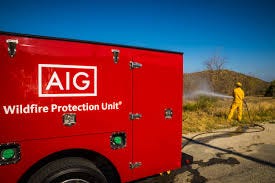Friends,
Trump has spent much of the past week complaining — and lying — about California’s water policies, falsely claiming that Los Angeles doesn’t have enough water to deal with the fires. (The actual problem is that hydrants haven’t had enough water pressure to deal with the huge, sudden demand.)
Trump is now blaming the fires on migrants. He posted a claim this week that taxpayer “funds are diverted to illegal immigrants,” and then “an illegal immigrant comes and sets your house on fire and the fire department doesn’t have the resources to put it out.”
When he was on the campaign trail, Trump repeatedly threatened to withhold disaster aid from California. “We’re going to take care of your water situation, and we’ll force it down his throat,” Trump said during a rally in Coachella, California, referring to California’s Democratic Governor Gavin Newsom. “And we’ll say: Gavin, if you don’t do it, we’re not giving you any of that fire money that we send you all the time for all the fire, forest fires that you have.”
Republican House Speaker Mike Johnson and other congressional Republicans say federal help for Los Angeles should have strings attached. They’re criticizing California’s “liberal policies” and its management of water and natural resources.
But conditioning federal aid on policy changes would mark a major change in how America responds to disasters. After all, recent hurricane funding for mostly GOP-led states passed Congress without any strings attached.
Which raises a fundamental question about America — especially the one we are moving toward under Trump II: Are all of us in this together, or are we on our own?
In September 1718, Boston organized the “Boston Fire Society,” the nation’s first mutual aid firefighting organization. But it was an on-your-own system. It protected only its members — who pledged to fight fires at each other’s homes, rescue each other’s property, and guard each other against looting.
By contrast, Philadelphia’s Union Fire Company, organized by Benjamin Franklin in 1736, was devoted to protecting the city as a whole. Its we’re-all-in-this-together model was replicated around America as cities and towns gained senses of civic responsibility. Public fire departments also proved cheaper, on the whole, than reliance on private firefighting associations that protected only their members.
In Los Angeles this past week, some wealthy property owners harkened back to the on-your-own model by hiring their own private firefighters to protect their own estates and businesses.
Private firefighting came sharply into public view in 2018, after it was reported that Kim Kardashian and Kanye West hired private firefighters to protect their Los Angeles mansion from the Woolsey Fire that year.
Demand for private firefighters has grown across America as wildfires have increased in ferocity and frequency. About 45 percent of all firefighters working in the United States today are employed privately, according to the National Wildfire Suppression Association, which represents more than 300 private firefighting groups.
The same fundamental question — are we all in this together or on our own? — is behind federal disaster relief. If lawmakers from Florida put conditions on federal disaster aid for California, why wouldn’t lawmakers from California reciprocate by putting conditions on federal aid to Florida after the next hurricane? And so on.
In many ways, a nation is really a giant mutual-insurance system. We pool our resources for the common good — whether that be disaster relief or highways or public schools or national defense. We’re all in this together.
But what happens if we lose our sense of common good?
What happens if wealthy individuals not only hire their own firefighters, but reject public schools and send their kids to private ones, stop walking in public parks and opt for private green spaces, and stop relying on public police officers in favor of private security guards?
That sounds a lot like the current trend.
And what happens if America’s red and blue states decide they don’t want to come to each other’s aid? As it is, taxpayers in blue states now subsidize taxpayers in red states, but what if we don’t want to do this anymore?
What if all of us begin to lose the understanding that we’re all in this together? Is that where Trump is taking us?




We are all in this together, but the 1/3 of the American voting public that did not show up to vote, doesn’t understand that… Yet.
There are those that say “history repeats itself.“ So they might posit we are headed for one hell of a recession/depression given the lack of competent people at the helm and the greater concentration of wealth at the top. Then there is the hope that the next reincarnation of FDR will come to save us and rebalance the scales.
I don’t accept this as our future. With the coming economic chaos, particularly fueled by a tariff for income focused economy and taxation system, there will be a greater realization that a total reliance on capitalism does not work and we need a better alternative.
One of the best ways to cope with the oncoming Trump led oligarchy is to plan now for the next and better system of democracy and a system of economics that will not permit wealth concentration, but which says everyone must have their necessities met before anyone is allowed to accumulate wealth. No, this is not communism or socialism. Those two systems rely on highly centralized planning and control of the economy and governance and that approach is not viable.
Now is the time to step forward with bold thinking and open minds as to what could be the future beginning 2 to 4 years from now.